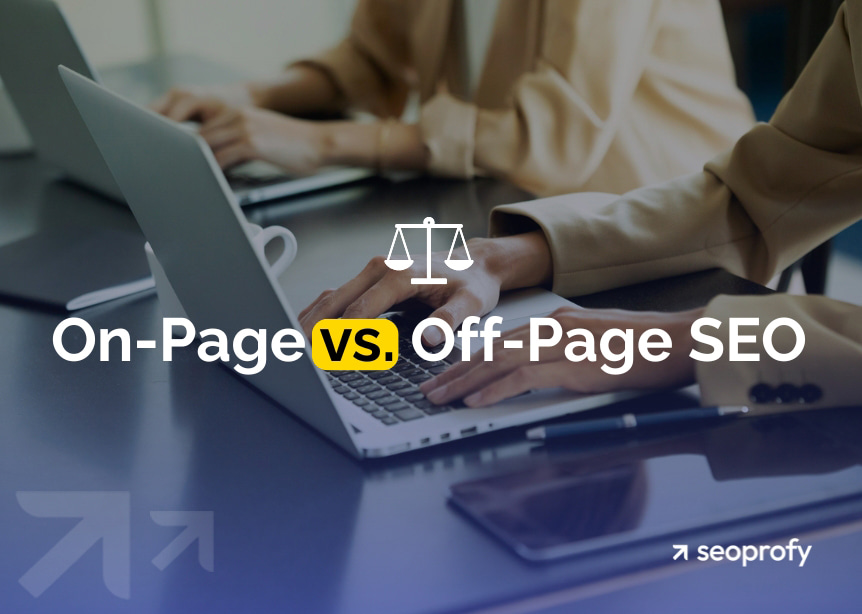There’s a reason SEO for family law and divorce attorneys has become a priority for firms that want to grow. It’s one of the most direct ways to bring potential clients to their door. Still, it’s not an easy space to compete in.
Legal keywords are among the most competitive in search engine results. You’re often up against dozens of local firms targeting the same queries. To win, you need an effective strategy that will help you succeed in your search.
In this guide, we’ve written down what works in divorce lawyer SEO and family law marketing at the local level. The strategies we’ll share with you are based on what we’ve already tested and applied for legal clients. So, if you’re looking to grow your law firm’s online presence, keep reading.
- Local SEO is a key growth channel for family law attorneys—boosting local visibility, attracting better cases, and building trust.
- Tools like KWFinder help divorce lawyers find accurate local keywords for more targeted campaigns.
- A complete Google Business Profile with details, photos, and reviews builds credibility in local search.
- Blogging still works when focused on high-intent, bottom-of-funnel topics that lead to consultations.
What is SEO for Family Lawyers?
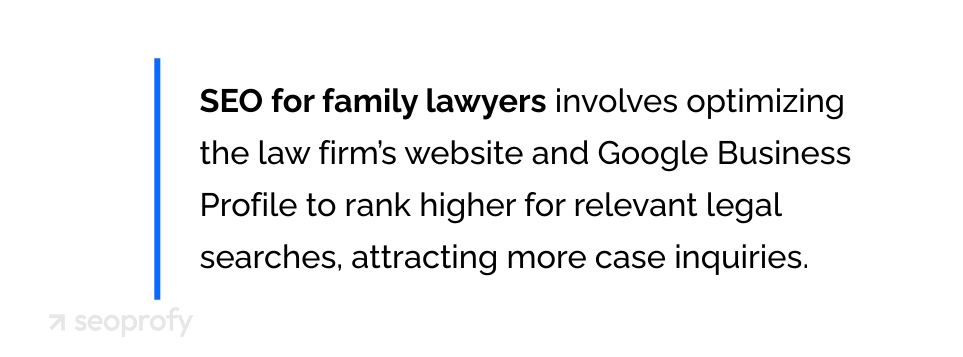
SEO for family lawyers is the process of optimizing a law firm’s website and Google Business Profile to help it rank for relevant legal queries and drive more case inquiries. When we say “rank,” we usually mean Google, but it can also apply to Bing and even generative AI models like ChatGPT, which surface-optimized content when users seek legal answers. As for the strategies, here’s what search engine optimization usually entails:
- Research relevant local queries your prospects use and add them naturally to your content.
- Work on your site’s technical performance so it loads fast and offers a good user experience for your visitors.
- Completing your Google Business Profile with all the important details like categories, services, and NAP.
- Securing backlinks from authoritative local sources and listing your business in local directories to strengthen your credibility and online presence.
Why Does Family Law SEO Matter?
At its core, law firm SEO helps attorneys appear in relevant places, such as Google’s map pack listings, when potential customers are searching for their legal services. But the benefits don’t stop there. Here are the other perks of optimizing your site:
Better Local Visibility
When people are looking for a divorce lawyer, mediation services, or advice on custody arrangements, Google will show them a local search result that looks similar to this:
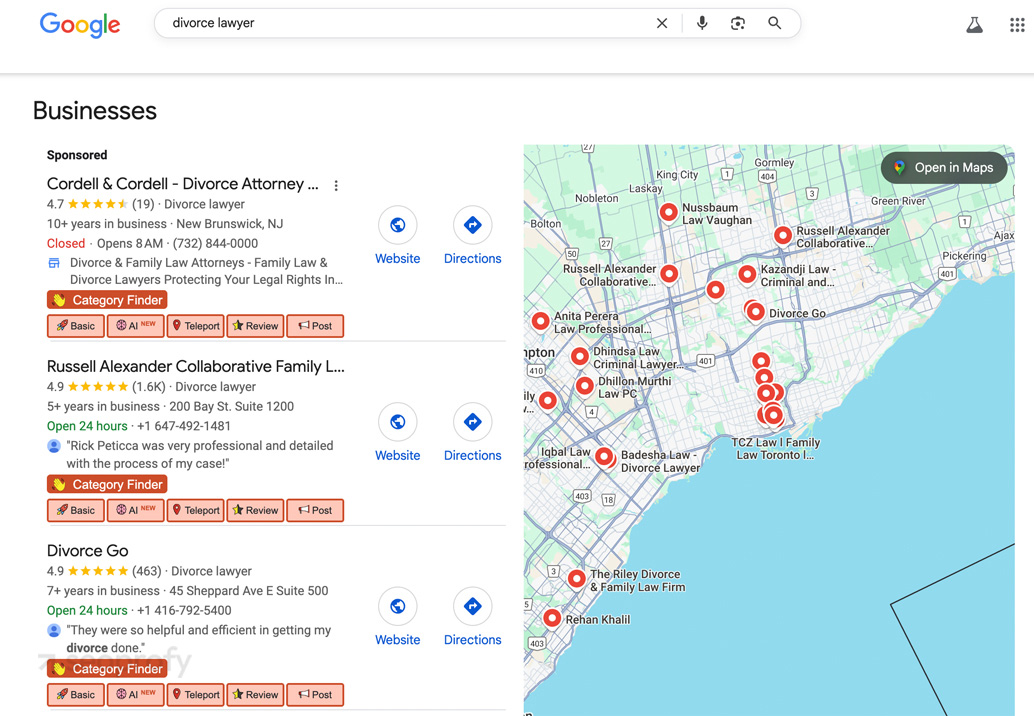
It happens because Google knows there’s a local intent behind these searches. And with the right local strategy in place, you can rank in this high-visibility spot and get more eyes on your practice. Research even shows that family law attorneys who show up in these local search results get 44% more clicks from users.
More Qualified Leads
Family law is broad, but your firm likely handles a few specific areas, like high-conflict divorce or fathers’ rights. SEO for family law firms helps you target keywords your ideal clients use when seeking legal services online, which puts your firm in front of individuals who need your expertise.
This precise targeting improves lead quality and, furthermore, reduces enquiries that fall outside your practice scope. It explains why 39% of law firms say their website is the main source of leads.
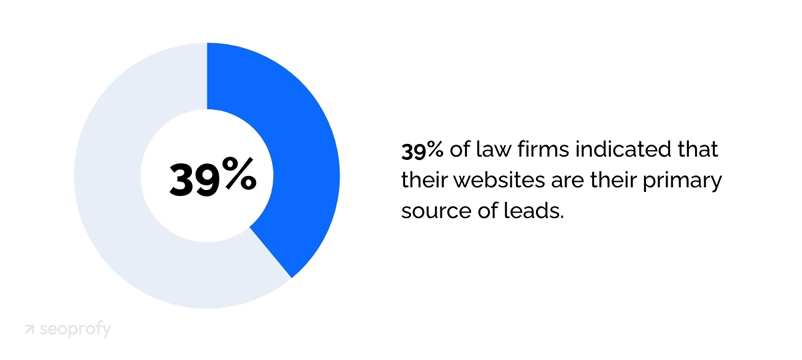
Long-Term Growth without Constant Ad Spend
Paid ads can bring traffic fast, but the moment you pause the campaign, that traffic disappears. With SEO for family law, it works differently.
You initially invest time and resources in site optimization and content. However, over time, your efforts consistently attract more visits, calls, and consultations. This long-term visibility makes SEO one of the most cost-effective marketing channels for law firms.
Key Challenges Unique to Family Law SEO
SEO in family law comes with dynamics that aren’t always the same as in other industries. Here’s what often gets in the way:
- High local competition, especially in central areas and big cities like LA and New York
- Strict advertising and privacy rules that limit content and marketing claims
- Difficulty obtaining client reviews because family law clients often prefer privacy
- Need for a custom SEO strategy for every service and location
- Rapid Google algorithm updates that require ongoing monitoring
Core SEO Strategies for Family and Divorce Attorneys
Let’s now review proven divorce attorney SEO tactics you can use to amplify your reach in search engines and get more clients for your family law practice.
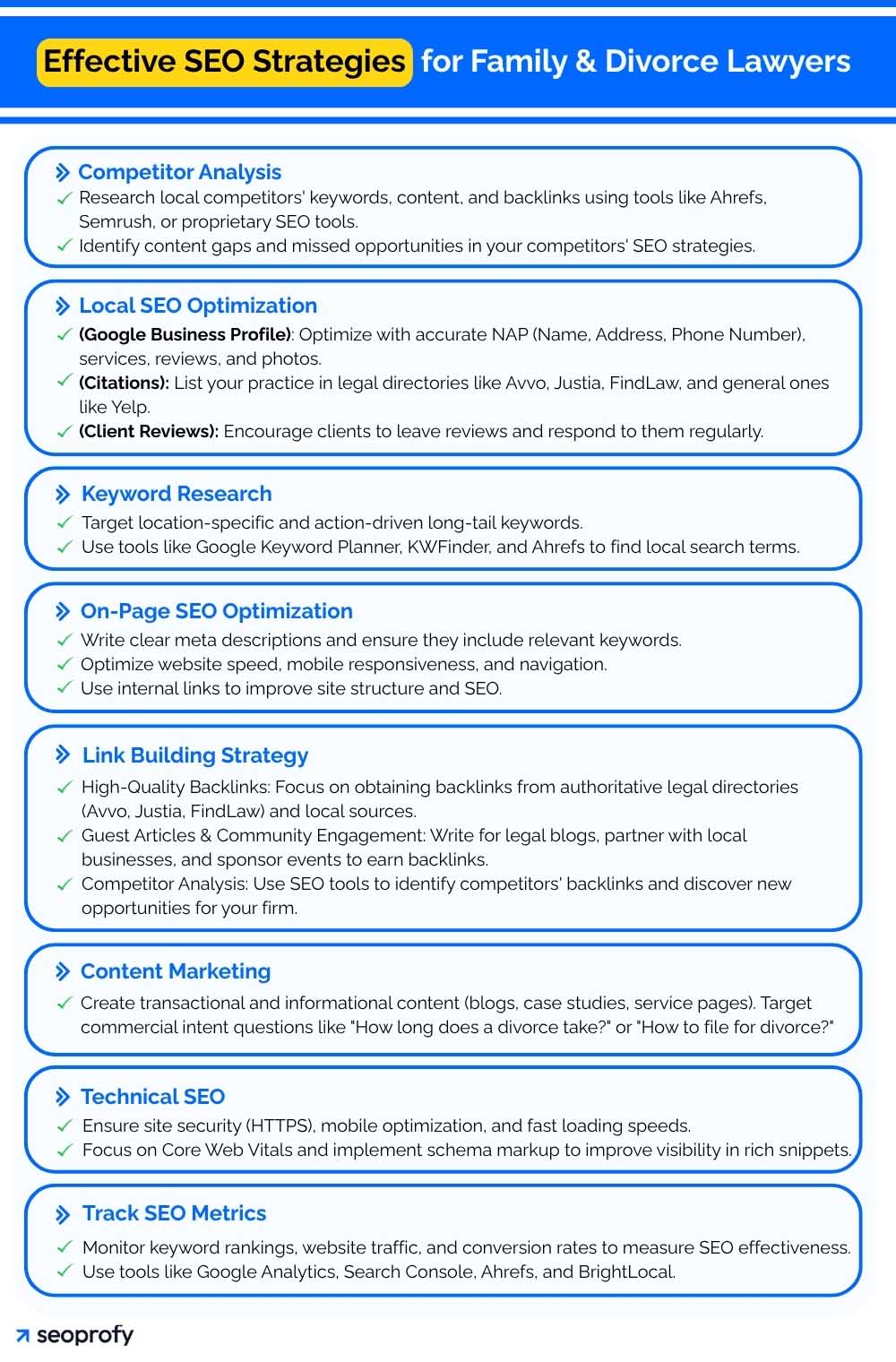
Analyze Your Competitors
You probably already know that the competition in family law is fierce. So, to increase your chances of outranking other firms, you first need to understand how they’re handling their SEO strategies.
At SeoProfy, for example, we start our SEO services for family law firms with a detailed review of the local competition. For this, we use our internal tool, Search Analytics. It shows us the keywords they rank for as well as other important metrics. Here’s a screen of our dashboard:

But that’s not all. We also have a feature that shows us how these firms are attracting leads across all marketing channels, not just search. It’s called the competitor dashboard, and it gives us a bird’s-eye view of their digital marketing efforts.
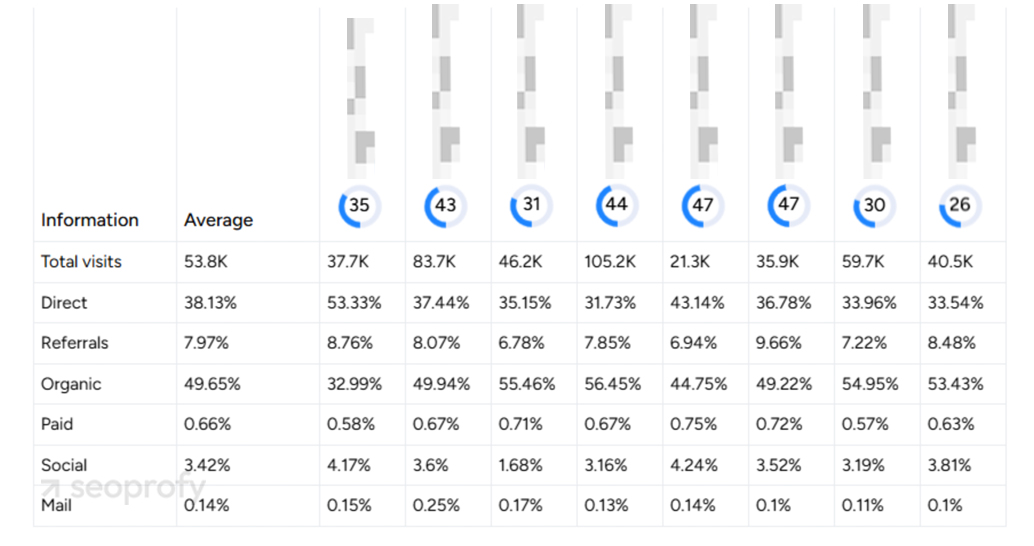
While proprietary tools like SeoProfy’s Search Analytics offer advanced insights, platforms such as Ahrefs and Semrush can also help law firms evaluate local SEO performance. Focus on extracting competitor keywords, content types, and backlink sources to inform your SEO strategy.
Our custom-built SEO tools show our clients a snapshot of how other family law and divorce firms in their area are performing online. You’ll see:
- The local search terms they rank for
- The pages that drive most of their traffic
- Gaps in their content and site setup

Optimize Law Firm Website for Local SEO
Local SEO for attorneys connects your practice with people who search for legal help in your area. To show up and stand out, your site needs to be easy to find and give potential clients the trust signals they’re looking for. Here are a few strategies to help with that:
Google Business Profile Optimization
Your law firm’s Business Profile is a core element for local visibility. Beyond the basics, like completing it with your local address and contact information, here’s what we recommend:
- Choose your main category and use the services feature to add the types of cases your practice takes on, such as divorce mediation or custody agreements. This helps potential clients understand what you offer and also allows Google to match your profile to relevant searches.
- Ensure your Name, Address, and Phone Number (NAP) are accurate and consistent across all platforms. Adding office photos and attorney headshots can enhance trust and click-through rates.
- Whenever possible, ask previous clients to leave reviews. At the same time, respond to both positive and negative feedback. Review activity is a major ranking factor, and a steady stream of new feedback helps your firm appear credible in search engines.
Finally, watch for new features that Google rolls out for business profiles. The platform is always changing, and the quicker you adopt new options, the more advantages it can give you in search results.
Citations and Legal Directories
Family and divorce law firms have a few ways to build backlinks. The most common one in SEO for family law is to get cited in reputable legal directories, which signal local relevance to Google.
The more such mentions your business collects, the better. It can help you rank higher in local search results and attract clients to your practice. Therefore, get your firm listed in niche directories (Avvo, Justia, FindLaw) and general ones, like Yelp.
Reviews and Reputation Management
In marketing for divorce lawyers, online reviews directly influence your search rankings and how prospective clients perceive your practice. They show up right on your Google Business Profile, front and center in search results.
And anyone searching for a divorce or family lawyer in your area will see what others have said about working with you. That’s your credibility on display, and here’s how you can manage it in family law SEO:
- Reply to every review, even the negative ones. A thoughtful response shows you care about your clients’ experiences.
- Keep your replies professional and straightforward. Acknowledge feedback and, if needed, offer to talk things through privately.
- Go the extra mile for your clients. When you provide top-notch service and treat people well, they remember and are more likely to leave a positive review or recommend you to others.
Conduct Keyword Research for Your Law Firm
For any SEO strategy to be successful, it needs to start with the keywords. Your legal clients are typing in specific queries when they search, so you need to find and target them in your content to get more organic search traffic.
As for the tools, Ahrefs and Semrush can work, but for more location-specific data, we recommend KWFinder and Google Keyword Planner. Both let you enter a city or region so you can see what people search for in the exact areas your firm serves, not just nationwide.
For example, here’s the keyword data in the U.S. The seed term gets 84,800 searches a month with a keyword difficulty of 43.
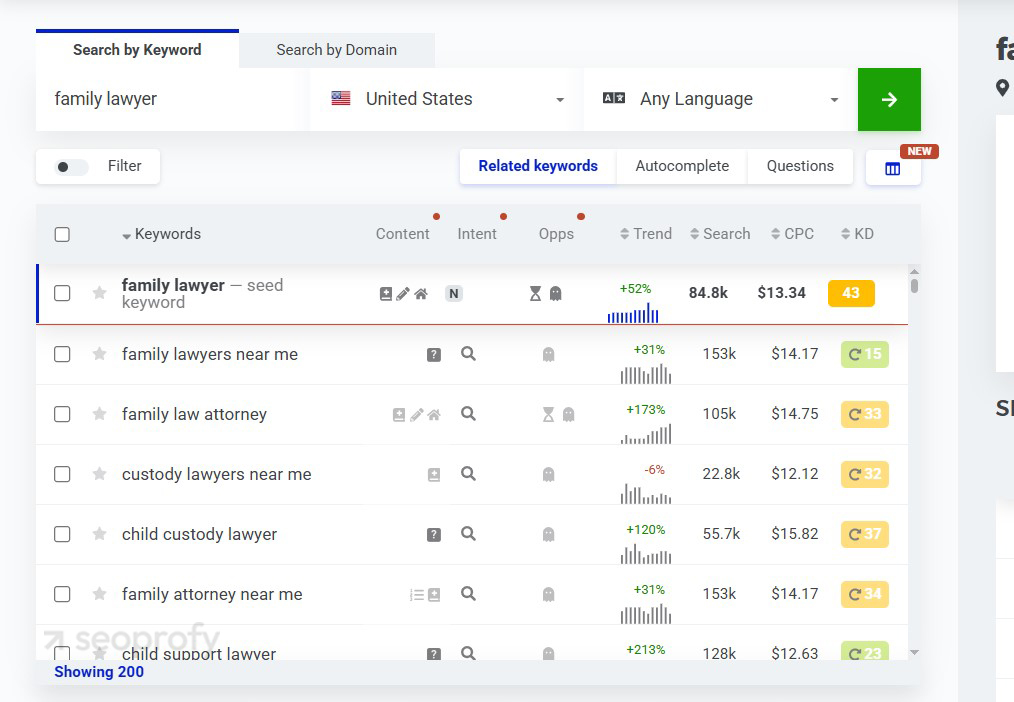
But if we look at a specific area like Chicago, the search volume drops to 850 and the keyword difficulty to 23.
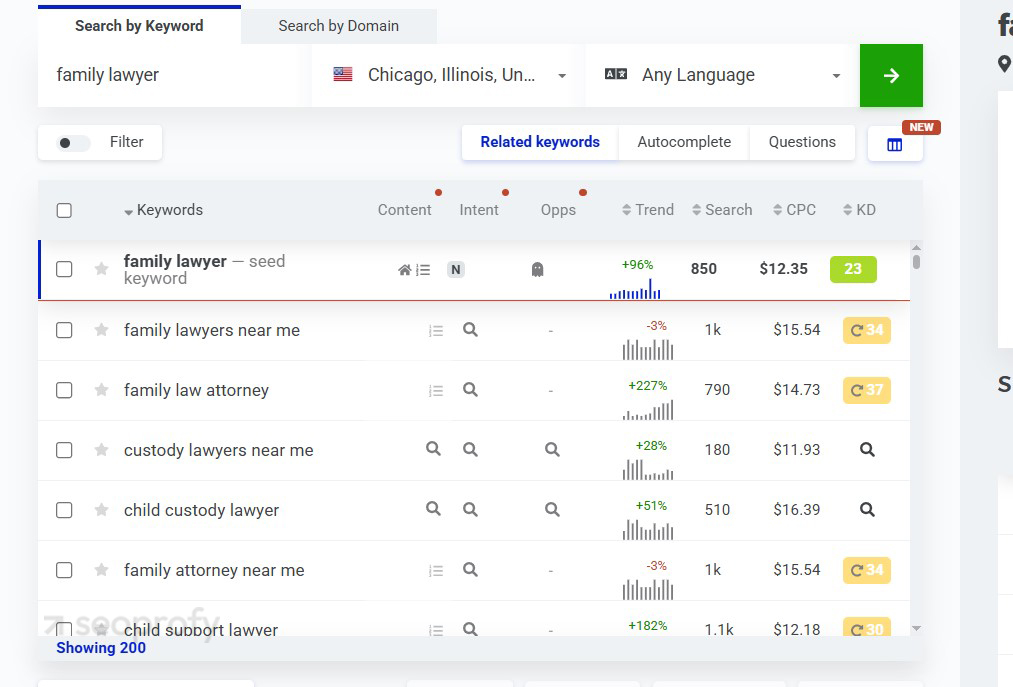
It’s easy to see that different locations surface different search data, and it’s important to do the research for your specific area. It’ll give you a better understanding of what terms to go after in your keyword strategy.
As for the Google Keyword Planner, it’s helpful when you’re trying to find long-tail terms for your family law practice. These are more specific queries that contain more than 3 words. They tend to reflect more specific legal needs and often match the types of queries that lead to consultations.
That said, in SEO for divorce lawyers, it’s best to prioritize queries that are:
- Tied to your main family law services, like “child custody attorney” or “spousal support lawyer.”
- Location-specific, for example, divorce mediation in Logan Square, or near me.
- Action-driven, such as “book a divorce consultation” or “hire a lawyer for a custody case.”
Optimize On-Page SEO Elements of Your Family Law Website
On-page SEO involves optimizing your content, internal links, and overall structure to give more context to Google and improve your rankings in search engines. Here are a few SEO tips for family lawyers to help you get it right:
- Write clear meta descriptions that encourage people to click. Include your target keyword and keep it under 160 characters long.
- Link your pages to each other so visitors can find more info easily. It also helps Google understand your site better. For example, if you have a blog about divorce, link to your page on child custody or spousal support.
- Make sure your site loads fast on the web and mobile. Use free tools like Google Search Console or PageSpeed Insights to check your current performance and fix what’s slowing you down. Fast pages keep visitors happy and also help SEO.
- Use the above-the-fold section to explain what you do and how people can contact you. Add a headline with your main keyword, a short line about your services, and a way to get in touch, like a call button or contact form.
Improve Technical SEO for Divorce Attorneys
All the strategies we’ve talked about so far can only be effective when your family law website has good technical health. It’s the foundation that helps Google find your pages, understand them, and include them in the search engine results pages. Let’s look at the areas you need to keep in check:
- Site security and HTTPS: The padlock in the browser shows that your site protects user data. It also gives you a small advantage in rankings, since Google prefers secure websites. If your site hasn’t been updated yet, ask your developer or hosting provider to make the switch.
- Core Web Vitals (CWV): Google checks how fast your site loads and how smooth the user experience is. And in family law, many of your visitors are searching for help right away. You can run a quick test with PageSpeed Insights to find and fix issues that slow your site down.
- Mobile optimization: Most people will land on your site from a phone, so it needs to work well on small screens. Mobile-friendliness is also a ranking signal, which can influence the results you see from SEO.
- Crawlability and indexing: Google uses bots to scan your site and decide which pages to show in organic search results. If some of your pages are blocked for any reason, they won’t appear. To check it, you can use the indexing report inside the Google Search Console.
- Schema markup: Structured data is a bit of extra code that helps search bots understand your site better. You can use it to show your services, address, contact info, or client reviews in the rich results and make your firm more noticeable. Schema markup enhances how your content appears in rich snippets and helps large language models (LLMs) like ChatGPT interpret and reference your site in AI-generated responses.
Most family law firms don’t have someone on the team who handles technical SEO. If that’s the case for you, we offer a technical SEO audit designed for law firm websites. After we go through your site, you’ll get a report with a prioritized list of issues and actionable advice, so you can either fix them yourself or hand them off to a developer.
Plan a Link Building Strategy for a Family Law Attorney
Link building is one of the oldest ranking factors, and it still works in SEO for divorce lawyers if you do it right. In competitive legal markets, the websites that rank at the top usually have more trusted links pointing to them.
Not just any links, though. Google favors backlinks from high-authority domains relevant to your practice. Before building links, analyze top-ranking pages for your target keyword and determine if you need to optimize a homepage or a service-specific landing page.
We’ve already mentioned legal directories as one way to get backlinks. Now let’s go over a few other tactics we use in our link building services to help your practice earn high-authority mentions:
- Guest articles: Reach out to the bar association, specialized legal blogs, or even local business sites, and offer to write about topics on family and divorce law. In return, you’d get a link to your site and some extra visibility.
- Community engagement: Support a local nonprofit or sponsor community events. This can get you a mention on their website and build trust with your prospects.
- Social Media: Post your legal expertise and share advice on LinkedIn and Facebook. Not only does it generate more clients for your firm, but it can also lead to others linking back to you naturally, especially if the post is educational or has original data in it.
At the same time, look at who links to top-performing family law firms in your area with the help of SEO tools. That will give you ideas for new sources of backlinks for your practice.
When planning link building for lawyers, check what types of pages rank for your main keywords. In the screenshot below, you’ll see the SERP for “family law attorney Austin.” Most of the top results here are homepages.
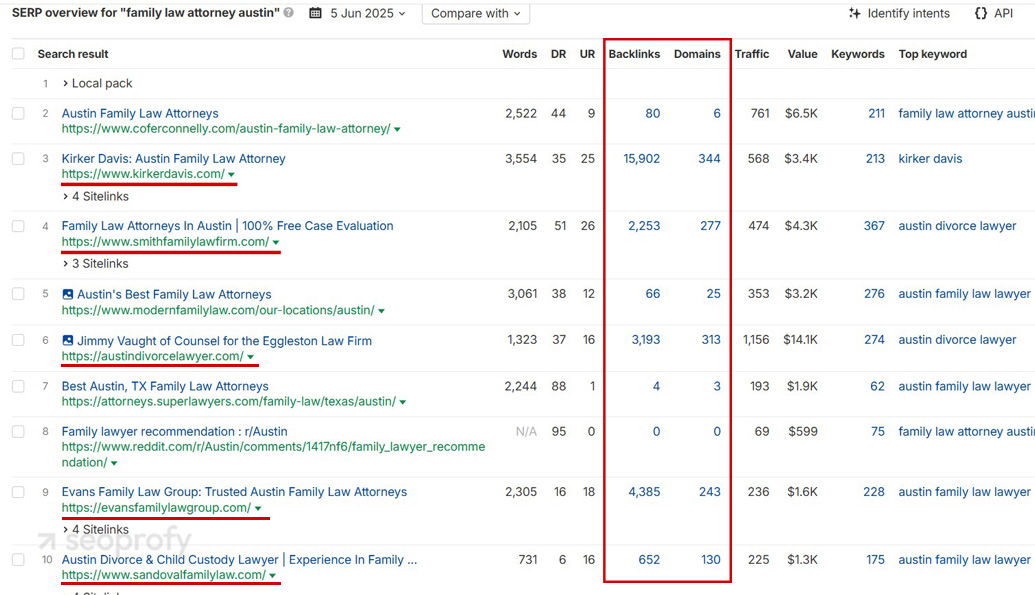
Now compare that to the SERP for “Austin child custody attorney.” This one includes a mix of homepages and internal pages.
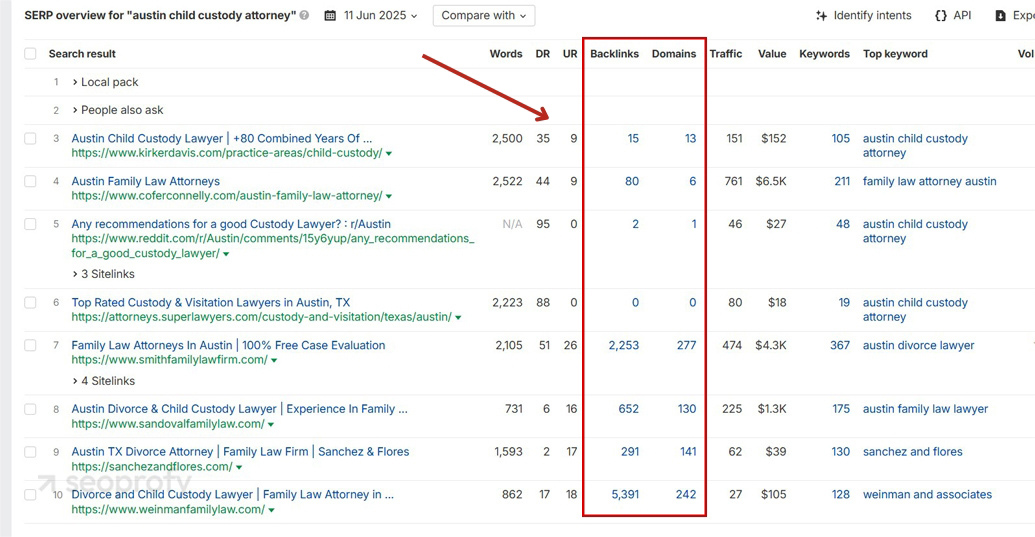
That’s important because homepages usually have more backlinks and trust signals. So if most top-ranking results use a homepage for a specific keyword, you’ll have a harder time ranking an internal page for it. Therefore, always check which type of page ranks for your main keyword and align your strategy accordingly.
Content Marketing for Family Lawyers
Legal content writing is one of the most effective ways to support search engine optimization for divorce lawyers. Research shows that 54% of law firms publish legal articles on their site, but more importantly, 29% say clients found them through those blog posts.
As for the formats, there’s more than one you can use in your strategy. Blogging can help you address the common questions and pain points your prospects have. That said, we recommend writing fewer posts targeting broad “what is” searches, as these are now often answered in AI overviews.
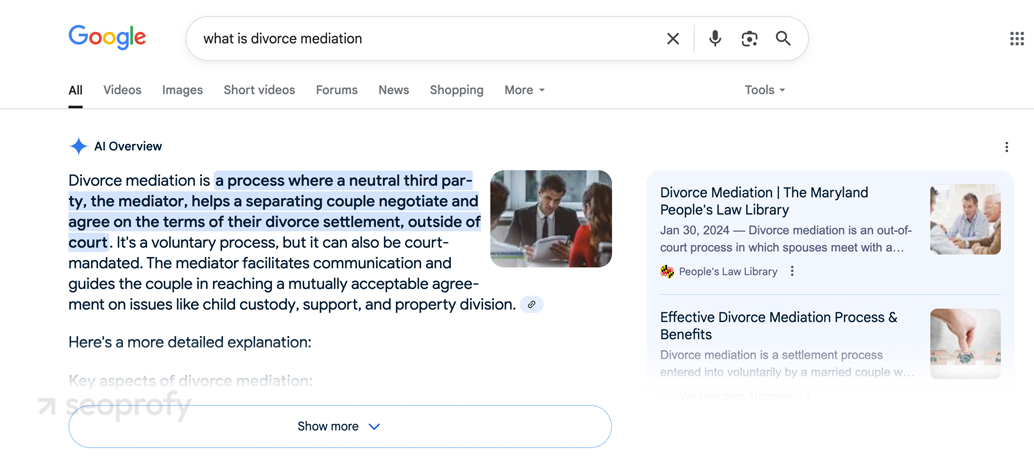
Such queries rarely lead to site visits or new consultations. A better use of your time is to write legal blogs that answer questions with commercial or transactional intent, for example:
- How long does a divorce take in [state]
- How to file for divorce in [state]
- How much does a divorce lawyer cost
People who type these in are further down the decision process. They’re reviewing their options and are likely to contact a firm that gives them the answers they need.
To speed up the process of writing your blog, you could use AI content for SEO. For example, draft outlines, summarize case law, or optimize it for the necessary keywords.
Another format that works well is case studies. Your prospects will look for these to see your past cases. Therefore, it’s worth sharing the results you achieved for your clients (with details changed for privacy).
Finally, let’s not forget about your services pages. These are the core parts of on-page SEO for family law because they show the types of cases you handle. When you’re working on them, explain to people what the process looks like and what they can expect from working with you.
Measure Your SEO Efforts and Adjust Your Strategy
Tracking your SEO results is the final step, and it’s better not to skip it. It helps you see changes in visibility, engagement, and conversion to understand how well your online efforts are working. Some of the SEO metrics to track are:
- Keyword rankings: See where your site appears in search results for your main terms. That gives you a read on your visibility in search engines.
- Website traffic: Track how many visitors come from unpaid searches. When that number grows over time, it means your content is starting to reach more people.
- Conversion rate: Measure actions like form submissions, phone calls, or consultation bookings. A high conversion rate shows that visitors are engaging with your site and considering your firm.
- Local visibility: Watch how often your firm appears in Google Maps and local results, including engagement with your GBP, such as clicks, reviews, or map directions.
- Backlinks: Keep track of who links to your site or mentions your firm online. Sometimes, links can be harmful, so it’s better to review them regularly and disavow them if needed.
As for the tools you can use to measure your results, the best ones for law firms are Google Analytics, Search Console, Ahrefs, BrightLocal, and CallRail. Each of these helps you see the effectiveness of your campaigns as well as the ROI of SEO you get.
Grow Your Visibility with a Family Law SEO Company
Family law is one of the most competitive fields online. For this reason alone, it’s best to partner with a law firm SEO agency that knows all the tried-and-tested strategies in this niche.
At SeoProfy, we specialize in family law SEO services and work with legal firms on a regular basis. Our clients rank higher for local keywords, attract more organic traffic, and receive more booked appointments.
So, if you want to grow your practice and give it the local visibility it deserves, schedule a free consultation. We’ll design a custom SEO plan for you that builds authority in your local community and helps you serve families and individuals when they need you most.








